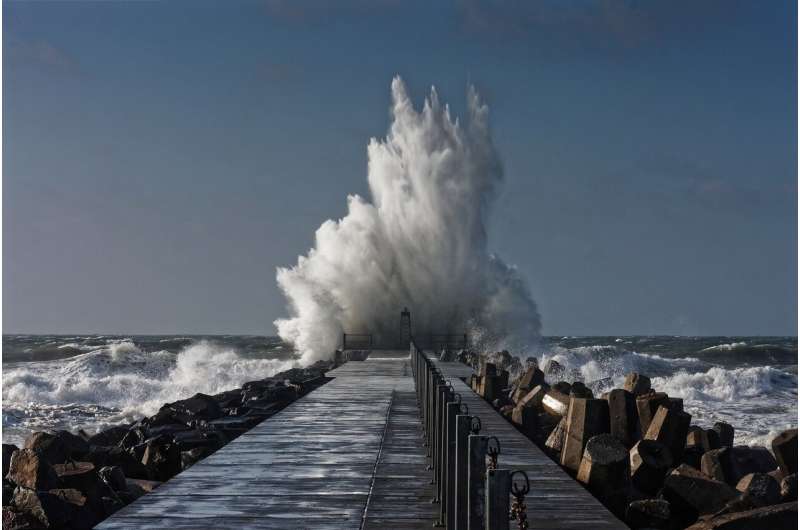Sea shanty and storm data collide in project demonstrating impacts of climate crisis

Scientists have transformed data captured during the most energetic series of extreme storms on record into a musical piece demonstrating the effects of climate change.
Song of the Sea, created by the University of Plymouth, has been released to coincide with the 26th UN Climate Change Conference of the Parties (COP26), which gets under way in Glasgow this weekend.
It takes a popular sea shanty, "What shall we do with the drunken sailor?," and manipulates it using actual data captured by the Southwest Regional Coastal Monitoring Programme.
The result is a piece that listeners will initially recognize, but which then changes as the data reflect the stronger winds and higher waves generated as the storm reached its destructive peak.
The project is the result of a collaboration between the University of Plymouth's Marine Institute and its Interdisciplinary Centre for Computer Music Research (ICCMR).
It is centered on data gathered over a 48-hour period in February 2014, which resulted in the main rail line being washed away at Dawlish in south Devon.
Those two days were part of a series of storms that wreaked havoc along the Atlantic coasts of western Europe, with research by the University subsequently demonstrating them to have been the most energetic storms to hit western Europe.
To create Song of the Sea, researchers assigned elements of the data to segments of the music and as the data changes the song changes with it.
For example, wave height data were aligned to an echo effect on the words, distorting them as they grew more powerful. Wind speed was assigned to tempo, speeding up the piece as it intensified.
Pressure was aligned with pitch, so that as the pressure dropped in the middle of the storm, the vocals deepen and grow more slurred and ominous. And temperature was assigned to a distortion effect on the drum, causing it to 'crunch' as the weather grew colder.
The project builds on the University's lengthy track record of combining science, the arts and other disciplines to enhance public awareness and appreciation of potentially complex areas of climate research.
Professor Richard Thompson OBE FRS, Director of the Marine Institute, said: "This project highlights our connection to nature and the very serious issues occurring as a result of climate change. It provides a snapshot of the devastation and destruction extreme storms can cause, but also shows how our relationship with the planet has become more distorted. As things stand, humanity is not dissimilar to the drunken sailor—intoxicated by its thirst for things, and unwilling to address the reckless plundering and destruction that results. Will we come to our senses in time? That has to be the challenge for the COP26 delegates in Glasgow."
Researchers working in the ICCMR have for many years endeavored to use ground-breaking musical compositions as a means of breaking down complex science.
In the past, this has resulted in the creation of a biocomputer, which harnesses the ability of slime mold to perform computational tasks, and a brain computer music interface (BCMI) that harnessed the brainwave signals of patients from the Royal Hospital for Neuro-disability (RHN) in London and enabled them to interact directly with musicians.
Professor Eduardo Miranda, Head of the ICCMR, added: "Historically, scientific data has normally been conveyed visually, as charts or illustrations. However, the combination of sound and images provides significantly more alternatives to convey information. Song of the Sea is a novel way of using actual climate data in such a way that it controls the music. And with extreme natural events predicted to increase in frequency and ferocity, there is no barrier to its principles being applied to represent the far-reaching effects of climate change on our planet."
Provided by University of Plymouth




















